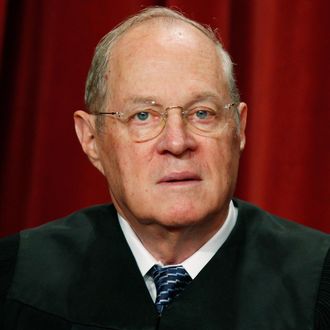
After nearly three decades on the U.S. Supreme Court, Justice Anthony Kennedy has carved out a truly distinctive role for himself in constitutional jurisprudence, and a reputation for ideological unpredictability. After all, he wrote the opinions in what are perhaps the 21st century’s leading landmark decisions from the conservative (Citizens United v. FEC) and progressive (Obergefell v. Hodges) points of view. Both were 5–4 decisions that he nonetheless turned into sweeping precedents, the first a bulwark against campaign-finance regulation and the second nationally legalizing same-sex marriage.
But while he has been fairly consistently conservative on cases involving commercial interests and voted the “right” way in the two emotionally pivotal Obamacare cases, conservatives are beginning to put the horns back on Kennedy following the latest Supreme Court term. From their point of view, Kennedy flip-flopped on two big cultural issues before the Court in the latest term.
In the second iteration of Fisher v. University of Texas, Kennedy wrote the opinion for a 4–3 plurality of the Court (Elena Kagan recused herself due to prior involvement in the case as solicitor general), upholding the Texas school’s race-conscious affirmative-action program after writing the opinion in the first iteration that remanding the case to a lower court for a finding of fact seemed very unfriendly to the university.
Much worse yet from the conservative point of view, Kennedy gave the Court’s liberals a 5–3 majority in the latest “big case” involving abortion, striking down a Texas law that was one of many that sought to exploit an avenue to abortion restrictions laid out by Kennedy himself in the 2007 decision Carhart v. Gonzales. In Carhart, one of the many 5–4 decisions where Kennedy has broken the tie and written the opinion, the Court upheld a federal ban on so-called “partial-birth abortions” based on a congressional claim that the law was focused on protecting the health and safety of the women seeking abortions. But in Monday’s Whole Woman’s Health v. Hellerstedt, Kennedy supported Justice Breyer’s determination that the state’s not-very-convincing argument that it was trying to protect women’s health was far outweighed by the practical impact on access to constitutionally protected abortion services. Had Kennedy gone the other way, the Court would have been deadlocked 4–4, the Texas law would have stayed in place, and abortion-rights advocates would have been denied a landmark decision.
Kennedy’s power as the king of a divided Court was aptly summarized by conservative writer John Podhoretz, who tweeted: “Everybody’s upset about Brexit, but basically the United States is now being governed by one 80 year old man.” (Kennedy turns 80 next month).
You can expect past conservative wrath at Kennedy to experience a revival. They’ll remember his signal offense to American exceptionalism in citing foreign and international law in a death-penalty case. They’ll excoriate him for replacing Sandra Day O’Connor as the “swing vote” who robbed a Court largely appointed by Republican presidents of countless conservative victories. And they’ll never forget his ultimate betrayal in becoming the chief judicial advocate of gay rights (Lawrence v. Texas, which struck down state sodomy laws and U.S. v. Windsor and killed the Defense of Marriage Act) and then same-sex marriage.
It was in the wake of Obergefell that the Heritage Foundation’s Betsy Hart painted Kennedy as the main target of conservative bitterness about the betrayal of the Cause by judges appointed by Republican presidents — even the sainted Ronald Reagan, who appointed Kennedy after conservative heartthrob Robert Bork was rejected by the Senate:
No one at the time thought backing down from fighting for Bork would lead to the calamity that Justice Kennedy has been in countless narrow decisions over the years, most recently last week.
That demonic Kennedy is back after a brief absence during which he wrote Citizens United and opposed John Roberts — for a bit Kennedy’s replacement as a conservative pariah — on the two Obamacare cases.
But conservatives should be as discreet as possible in blasting Kennedy. If conservatives look forward too gleefully to his retirement, he could time it to give a Democratic president — say, Hillary Clinton — another Court appointment. And if there is anything conservatives hate more than a flip-flopping, backstabbing conservative justice, it’s a faithful and predictable liberal. That’s what Kennedy could supply if he’s pushed too far.






























